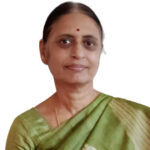Dear Fellow ISCCP Members,
With immense pleasure I have taken over as president of the ISCCP. I sincerely thank each one of you for trusting me and giving me the opportunity to serve our Society for the next two years, 2021 to 2023. Dr. Saritha Shamsunder, the super energetic outgoing president, has shouldered me with a great responsibility!
For the last 16 years, ISCCP has been doing a creditable work towards cervical cancer elimination in India. My primary task is to strengthen and expand on the foundation laid by my predecessors.
We are all aware that World Health Organization has given a global call on 17th November, last year, for elimination of cervical cancer by the year 2030. To reach this goal, we need to work on the targets 90- 70- 90; 90% of girls fully vaccinated with HPV vaccine by 15 years of age; 70% of women screened using a high-performance test by age 35 and 45; 90% of women identified with preinvasive and invasive cancer properly managed.
We, as committed members of this Society, need to work collectively towards reaching these targets, realizing our goal within in the stipulated time, which is just 9 years away!
We should reach each and every nook and corner of our vast country with suitably tailored public awareness programs to impart knowledge and education to women, girls and their families about cervical cancer. We need to consolidate this by organizing screening camps in the local communities along with screen and treat approach. Wherever possible, mothers need to be motivated to take their daughters for HPV vaccination.
The bigger challenge for us is to engage those in power to allocate funds for training manpower at all levels and include cervical cancer screening as a universal pre-requisite for any form of health insurance as well as vaccination against HPV in the universal immunization schedule. We should work with the paediatric societies in achieving the latter objective.
Our next objective is to train the younger generation of gynecologists in preventive oncology, with a special focus on cervical screening modalities, colposcopy, treatment modalities for precancer and long-term follow-up. This should be incorporated into the post graduate curriculum.
Similarly, all practicing Gynecologists, Preventive Medicine, Family Medicine specialists and General Practitioners are to be trained to practice these as part of their regular clinical work. Suitable incentives must be built in towards a reward system for ensuring maximal coverage.
The Society must increase the training and accreditation of colposcopists. Equally important is the training in cytopathology and molecular diagnostics for HPV detection. Nurses too should be trained in several aspects of the screening program. We must help develop artificial intelligence-based algorithms for interpretation of colposcopic images as well as mass screening of cytology specimens. These strategies will provide enough trained manpower and point of care solutions for the success of the program.
Educational activities like CMEs, online teaching and offline training modules, quarterly newsletters and annual conferences will need be continued for constantly updating our knowledge in the field of cervical cancer elimination. Every single member can contribute to this effort, through active participation, constructive suggestions and criticism.
For any activity to sustain or any organization to grow, we need to collaborate with other professional bodies with similar ideology, governmental and non-governmental organizations.
Truly, our Society’s members are our immense strength. We must increase our footprint, as well as arm ourselves with everyone the skills enumerated above. Let us all unite and work together to deliver a cervical cancer free India.
Warm Regards & best wishes,

